"She was a woman drawn to the border. She was drawn to battle; into the cycle of war and revenge. She never professed to understand war or to understand revenge, and as a woman, the fury puzzled her, but something inside her pulled her there, and she could not explain why. It burned into her heart, burning like a fire, unquenched by any snow, by any ice, by any cold. Perhaps the magnetism of the border and the battles of others came to her because she was a veteran of her own battle, her own war." ~~Winona LaDuke, Last Standing Woman
The White Earth Indian Reservation in northwestern Minnesota seems far removed from the oil catastrophe unfolding on the Mississippi Delta on the Gulf of Mexico, until one realizes that Gaa-waabaabiganikaag (Ojibwe for "Where there is white clay") is a stone's throw from the headwaters of the Mississippi River. White Earth is also the home of Winona LaDuke, Executive Director of Honor the Earth. Among other things, and with a substantial resume behind her, including two stints as Ralph Nader's running mate on the Green Party ticket, LaDuke works on a national level to advocate, raise public support, and create funding for frontline native environmental groups. We met LaDuke over a cup of coffee, wild rice soup, and an unbelievably tasty arugula salad she grew and picked herself. We had barely settled in when LaDuke made a profound connection, provided a riveting image, and offered to help.
LaDuke said that Honor the Earth made a decision in late June to apply $l0,000 of it's resources to support Indigenous communities' advocacy in the Gulf of Mexico "in this time of disasters."
The original request was made by Faith Gemmill of Red Oil (Resisting Environmental Destruction on Indigenous Lands). A Gwichin Woman from Alaska, Gemmill has thirty years of experience in opposing oil exploitation and oil companies, such as Exxon after the Valdez Disaster. Honor the Earth issued a challenge to other Native American Foundations and philanthropy to also put resources into the Gulf, LaDuke said.
"I feel like we are watching the country being soaked in oil in the North and drowned with BP oil in the South. Oil is drowning our oceans and drowning our boreal forests." When she saw the question in my eyes, LaDuke was mildly surprised. "And you don't know about the Canadian tar sands? Well, THAT certainly got your attention."
It certainly did, and after a few minutes of explanation from LaDuke that the Alberta tar sands project is the "single largest industrial project in the world," and that 80 percent of Minnesota's oil comes from Canada, LaDuke's metaphor came into sharp focus. She handed me an article from USA Today that brought the magnitude of the Canadian project and its potential for environmental destruction home.
The anticipated route from Idaho's Port of Lewistown to Canada's Alberta oil sands will take the rigs along the banks of Idaho's Lochsa River, a world-class fishery and popular whitewater destination, and Montana's Blackfoot River, of author Norman Maclean's A River Runs Through It fame.
The Athabasca oil sands are a massive deposit of bitumen -- a tar-like form of petroleum -- located in northern Alberta. According to the Government of Alberta Energy Department, bitumen, unlike conventional oil, requires intensive processing before it can be pumped into pipelines and transported to U.S. refineries. Environmental groups, such as the Polaris Institute, have called the Canadian oil sands "the most destructive project on earth."
National Public Radio reports TransCanada Corp. is planning a 1,600-mile pipeline from the Alberta tar sands to American oil refineries on the Gulf of Mexico. "TransCanada says not to worry. If there's ever a leak, the flow of oil will be quickly shut off."
Where have we heard that before? Another consideration is that the oil would be piped through hundreds of miles of wetlands--oil traveling through another "ocean" of water.
LaDuke did not mince words. "It is the most evil project on the face of the earth, and I want to do my part to stop it."
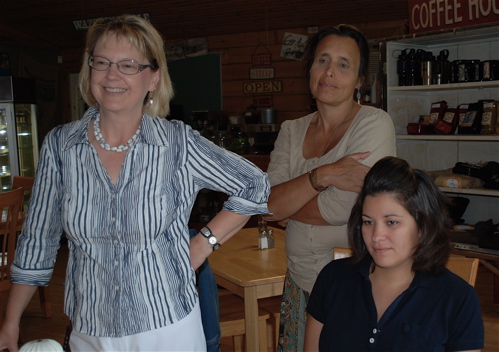
Minnesota State Senator Mary Olson (DFL-04), Winona LaDuke, Nellis Kennedy
Her words echoed an encounter I had in Plaquemines Parish, Louisiana, deep in the heart of the Mississippi River Delta.
Only two weeks before, I was 2,320 miles away on Grand Bayou, meeting with another formidable Native woman, Rosina Philippe, of the Atakapa-Ishak. The Atakapa-Ishak are literally under siege from the massive river of oil that is spewing from the BP wellhead disaster. What lurked beneath the surface of Grand Bayou was unknown, and reports were trickling in of oxygen deprived sea life due to the unprecedented use of millions of gallons of Corexit dispersant on the surface of the Gulf waters at the source of the runaway wellhead.
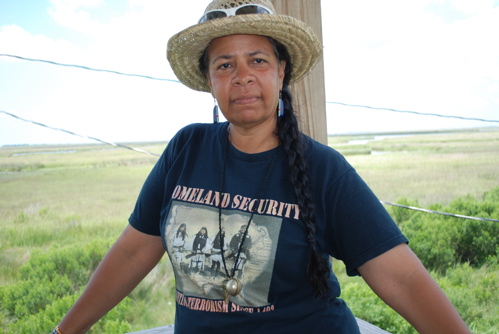
Rosina Philippe
When we met at the small boat landing at Grand Bayou Village, the first thing Philippe said was that it was critical that the voice of the Ishak community be heard as one. There were many voices on the battered Louisiana coast, but the People had one voice and she as their spokesperson would do her best to speak for them.
"We are the Atapaka-Ishak and this is our village in Grand Bayou," Rosina Philippe began.
A simple statement, but an affirmation of all that defines the People and their special relationship with the land and the water; the sky and earth; and the animal and plant life surrounding them in these ancient marshes. I thought about that statement as I sat across the table from LaDuke, and realized that these two women, although unknown to each other, were fighting the same battle. The People of White Earth are land-based and the Atapaka-Ishak are a water culture, but they are both under assault from oil and greed. LaDuke's drowning metaphor is all too real.
The meeting with Phillipe unfolded at the urging of Sister Helen Vinton of the Southern Mutual Help Association. SMHA is working closely with Louisiana's fishers to help them "survive the unprecedented doom they are facing in the wake of the current oil spill."
While expertly maneuvering her boat past luxuriant green grasses, yet untouched by the crude that had ruined Cat, Grand Terre and Queen Bess Islands and the pelican rookeries once sheltered there, Philippe spoke of community meetings held in the local parishes. By and large, these meetings with officials had proven to be a big disappointment. "We are a subsistent people and we need information. How can we plan for the next step without information?" She knew the answer, but presented the question as an existential argument. "The People are facing a new threat," the village needed the truth, and "the truth is in very short supply right now because so many people are looking out for their own interests. We cannot continue on with our lives until we get that information." Philippe likened the quest for truth about the chemicals in the Gulf waters to the proverbial attempt to "squeeze water from a rock."
At the northern end of the Mississippi, LaDuke is struggling to squeeze wind energy from a wind turbine project that recalcitrant officials and local utility inspectors want to stop, or at the very least are not supporting. The turbine, a Loland 75 kilowatt, is standing tall and ready in Callaway, Minnesota, with all 84 feet and 13,000 pounds of nacelle poised to power the community. But LaDuke says her organization is being forced to pay an interconnect fee that will upgrade the entire city of Callaway, which also happens to be the windiest city on the reservation.
The "Great Wind" is a constant in the lives of the Anishinaabeg people, and the revered "Ningaabii'anong Noodin" (West Wind) is a part of ancient tribal history. The wind turbine project had its genesis through the White Earth Land Recovery Project and Honor the Earth. This alternative energy project is an attempt to break free of the stranglehold that polluting industrial projects have on the north country.
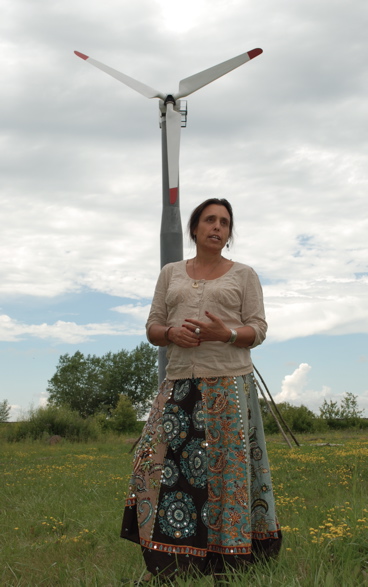
Winona LaDuke at White Earth Reservation
LaDuke talked about the mercury and heavy metal levels in once pristine reservation lakes that now have fish consumption advisories. Coal fired plants and incinerators are the sources of the contamination. "We are fully aware of the impact of coal-fired power plants on our lakes," she said, speaking passionately about native peoples, "our relatives," who are being directly impacted by the "addiction" for oil. "It's an addiction, and addicts tend to hang out with the suppliers of the drug." In this case LaDuke meant the oil and coal companies.
I was immediately struck with a memory that Phillipe had used the same analogy during our visit on Grand Bayou:
What powerful nation puts its national security in the hands of a non-renewable resource? How sad is it that our nation has no vision? If ever there was a time for people to see that we need to diversify, that we need to make some changes, not only to strengthen our energy policies but also to take care of everything that lives here with us on this planet. The time is now. We can't have our security and our lives dependent upon oil and gas. It is not dependence really, it is an addiction, and industry keeps feeding that addiction. It is almost as if the very thing that is destroying us is the very thing they keep pushing at us.
LaDuke shares much of the the frustrations experienced by Philippe.
LaDuke slammed the Minnesota Ottertail Power Company for being "punitive" in its refusal to allow the White Earth Recovery Project to supply its own power and have some to sell to the rest of the grid. Minnesota has the strictest electrical inspection standards in the United States. The Callaway turbine has passed all environmental and electrical inspections with flying colors, yet it is being blocked. Everything about the Callaway turbine is replicable for other communities, but LaDuke feels the regulations "are changed behind closed doors."
The endless hoops we are forced to jump through are difficult and illustrate a less than willing and supportive interest by a large coal-fueled utility. The end result is that our organization (WELRP) is being forced to upgrade a utiility that has made a good deal of money from inefficient technologies.
The bottom line is that Minnesota State and Department of Energy regulators have given the green light to power up the turbine, but Ottertail and its investors are dragging their feet. It is a blow to the project because since 2009 there has been an interconnect plan with Otter Tail Power to hook into the power grid and sell the energy WELRP generates back to the company via a power purchase agreement. Now, Ottertail can't or doesn't want to pay for the "smart grid" technology when the cheaper oil and coal technology is in place.
In a terrible disconnect, a third of the Native people on the Great Plains live in sub-standard housing and rotting trailers. "The irony is that these same Great Plains tribes have some of the greatest wind resources in the world. Tribes have the potential to provide almost 15 percent of the country's electricity with wind power, and have 4.5 times the solar resources to power the entire U.S.," LaDuke said in a letter to members of Honor the Earth.
I look at my own reservation the White Earth reservation in northern Minnesota - on my reservation, one quarter of our money is spent on energy. All of that money basically goes to off reservation vendors whether it is for electricity or whether it is for fuel. You know a quarter of our income is a substantial economy for our reservation and for any reservation. And so our strategy is to replicate what we are doing in White Earth, you know, nationally, and say instead of outsourcing, we can re-localize a good portion of our energy economy.
When I visited with Philippe, she had just returned from the waters of Jimmy Bay and an encounter with the thick mats of red slime and crude that we had witnessed plastered up against life-giving grasses of the estuary in Barataria Bay several days earlier. We went past houses that were destroyed in Katrina five years ago. The parallel is obvious.
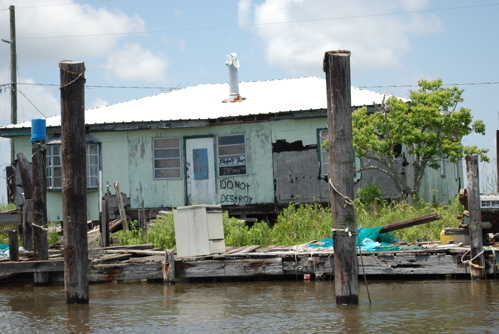
Katrina Damage In Grand Bayou Village (2010)
"It's not just marsh grasses that are being affected. The marsh is home to so many different animals and birds and marine life. It is our nursery and it is our rookery. It shelters the plants that we eat and our medicine plants-- it is all being destroyed right now because of what keeps rolling in 53 days after the explosion. It is still coming into the coast," Philippe said. And, as a subsistence people, the Village at grand Bayou is totally dependent upon the water for their livelihoods--water that is choked with oil.
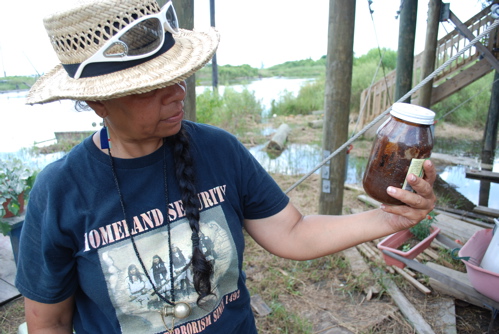
Philippe with mason jar of BP oil
Is there any hope?
While at White Earth, LaDuke offered hope in the guise of a prophecy.
"Ojibwe prophecy speaks of a time during the seventh fire when our people will have a choice between two paths. The first path is well-worn and scorched. The second path is new and green. It is our choice as communities and as individuals how we will proceed."
But, will the northern power companies allow White Earth to proceed?
And, will the native people of the South have any choice in their future?
Philippe also offered a prophecy during our time together.
I have a prophecy that my grandfather, Joseph Philippe Maher, told me. It was given to him by the grandfathers before him. I shared it with my daughter and my young relatives. He said that change would come and that the world as we know it would not stay the same, but that we must keep our land. You fight to keep your land and as long as you have the land you know you have a place and your place is secure. All the material things that make up your life can come and go.
I guess his people had seen so much uncertainty, with storms coming in, but he said 'as long as you have the land you have a place." I believe that with my whole heart. You know I love my home and I love the things and the comforts that we have here. But if I had to live in a palmetto hut on my land I couldn't think of being anywhere else because I remember what he said. As long as you have the land, your place in the universe is secure.
This is his truth. It is our truth.
Even now, the river of oil resulting from the explosion of the Transocean/Deepwater Horizon is snaking its way through the Gulf of Mexico, threatening precious shores, estuaries, wildlife and an ancient civilization's way of life on Grand Bayou.
Look north and TransCanada Corporations's 1,600-mile pipeline is poised to wind through the boreal forests and northern wetlands as surely as the river of oil is slithering its way through the Gulf of Mexico and now, as far inland as Lake Pontchartrain and New Orleans.
That is today's truth. And Big Oil and big government said it could never happen.
A note:Near the end of out time together, LaDuke took me on a tour of the offices of the White Earth Land Recovery Office. We stopped at her office, a mere cubbyhole, really, while she looked for some files. She asked me to look at something hidden behind the door. No one would ever notice the two framed photos there, and it is a testament to LaDuke's humility that they are not on more prominent display. One is a poster from her Vice-Presidential campaign and the other, rescued from a fire that destroyed her home and possessions not long ago, was taken at the 1960 Democratic National Convention. Sitting front and center at one of the huge, round banquet tables was her father, one of the few "dark" faces in attendance.
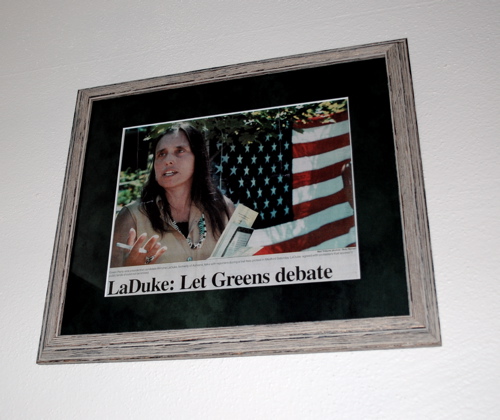
In 2007, Winona LaDuke was inducted into the National Women's Hall of Fame, recognizing her leadership and community commitment. In 1994, LaDuke was nominated by Time Magazine as one of America's fifty most promising leaders under forty years of age. She has been awarded the Thomas Merton Award in 1996, Ms. Woman of the Year (with the Indigo Girls in l997), and the Reebok Human Rights Award, with which in part she began the White Earth Land Recovery Project. The White Earth Land Recovery Project has won many awards including the prestigious 2003 International Slow Food Award for Biodiversity, recognizing the organization's work to protect wild rice from patenting and genetic engineering
A graduate of Harvard and Antioch Universities, LaDuke has written extensively on Native American and environmental issues. She is the author of five books, including Recovering the Sacred, All Our Relations and a novel, Last Standing Woman.
